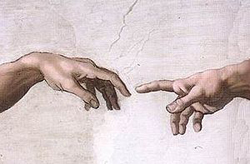 |
Story is to be read as story: a narrative that seeks to tell us something. Ancient storytellers didn’t share our modern preference for the historical event: Truth remains true whether it occurred in time or not. It’s a mark of our mortal self-absorption that we’re partial to what happens in history and reluctant to contemplate what belongs to eternity. The Genesis writers were collectors and arrangers of stories already being told in the oral tradition of Israel. They didn’t erase the seams of their sources but allowed them to stand side by side to enhance understanding through the appreciation of truth’s complexity. We see traces of these collections in the discrepancies, repetitions, and variant points of view. Here are a few of the truths these storytellers hoped to assert and preserve:
1. God is the ultimate source of everything, and therefore God alone is to be worshipped.
2. The sad history of humanity is that we steadily refuse to worship God alone.
3. God’s word is an event: When God speaks, things happen.
4. Humanity is also given the task of naming reality and sharing in dominion over reality.
5. God creates the world by establishing order out of confusion—literally cosmos from chaos in the Greek rendering. God calls this original order “good” and “right.”
6. Sin contradicts the divine will. It’s the choice we make for chaos that is neither good nor right.
7. Our freedom to choose makes us “like parent, like child.” It’s the basis of our relationship with God and lifts us above all other creatures.
8. Our choice against God’s will leads to the alienation from God that is the burden of sin. We carry this burden through history until God fully restores our relationship.
It would be pretty hard to get more truth from a story than that!
Online
• "God's Beloved Creation" by Elizabeth Johnson (America 184 no. 13:8-12)
• “Peace with God the Creator, Peace with All of Creation,” message of Pope John Paul II for the World Day of Peace, 1990,
Books
• Collegeville Bible Commentary Old Testament Volume 2: Genesis by Pauline A. Viviano (Liturgical Press, 1985)
• Genesis: A Commentary for Students, Teachers, and Preachers by John J. Scullion (Liturgical Press, 1992)
• And God Said What? An Introduction to Biblical Literary Forms by Margaret Nutting Ralph (Paulist Press, 2003)
Ask Alice a question.

More questions...and responses
What’s so important about the Council of Trent?
What are the “Precepts of the Church”?
Why can’t a woman be ordained?
Is Purgatory still “on the books”?
Why is it important to participate regularly in the Mass?
Why can people go to Mass on Saturday evening instead of Sunday?
Did King David compose the psalms?
Who were Jesus' “brothers and sisters”?
Is there really a Catholic Index of Forbidden Books?
What are the corporal and spiritual works of mercy?
What’s the difference between celibacy and chastity?
Is it “Catholic” to be vegetarian? Do Catholics care about animal suffering?
What does the Bible say about Judgment Day?
Why do Christians believe Jesus is God incarnate?
What’s that picture of Jesus with rays flowing from him?
Who chose the "Seven Deadly Sins"?
"What should I believe about hell?"
Is the Mass a “holy sacrifice” or a “celebration”—or both?
Pulpit, lectern, ambo: What’s the difference?
What is “discernment of spirits”?
Is environmentalism “Catholic” or a political football?
Why do Catholics believe in the Immaculate Conception?
Do Catholics believe in ghosts?
What is the Liturgy of the Hours?
How does God “answer” prayers?
What does “salvation history” mean?
Why do Catholics believe in the Assumption of Mary?
Why do priests wear vestments?
What is Catholic decision-making?
How does the Catholic Church view other religions?
What's the difference between chapels, churches, cathedrals, and basilicas?
Where do the Stations of the Cross come from?
What's the relationship between the Old Testament and the New Testament?
When and where is it appropriate to bow inside Catholic churches?
Can I come back to the church?
Why does the priest talk after the readings at Mass?
What's the difference between catechesis and evangelization?
Didn't Saint Paul write all the letters attributed to him?
Are we supposed to believe in angels and demons in the 21st century?
Who are the saints and why do we pray to them?
Who are the "Doctors of the Church"?
How were the books of the Bible chosen?
What's the difference between saying "set" prayers and prayers in my own words?
What do Catholics have to believe?
Who were the prophets? Does God still call people to prophecy?
Why do Catholics bless themselves, genuflect, and so on?
What do we mean by the church’s “magisterium”?
Is there salvation outside the Catholic Church?
What do people in religious life do for fun?
Why is celibacy important to religious life?
Vocation: For all of life, or only "religious life"?
Is my vocation from God or just my imagination?
What does the Bible say about discipleship?
How do I know whether be an order priest or a diocesan priest?
What do Catholics believe about scripture and tradition?
"Sin" is such a negative word. Can't we just talk about “failure”?

